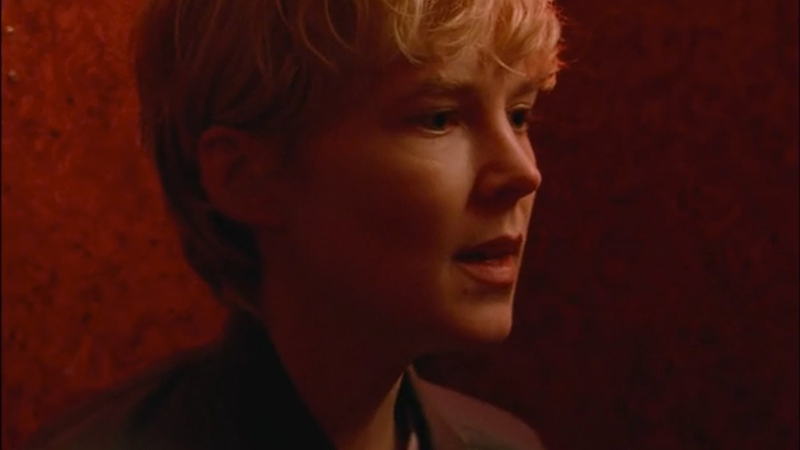Director – Georgia Oakley – 2022 – UK – Cert. 15 – 97m
*****
A woman attempts to keep her LGBTQ lifestyle and her day job as a PE teacher separate, but has reckoned without the widespread anti-gay prejudice of late 1980s Thatcherite Britain – previews in UK cinemas from Monday, February 6thprior to release on Friday, February 10th
“Everything is political”, says her out and proud girlfriend Viv (Kerrie Hayes) to Jean (Rosy McEwen), an LGBTQ woman who has to date managed to compartmentalise her existence so that work and private life are kept separate. She’d like to keep it that way too, because in her job as a teacher there’s an underlying assumption that heterosexuality is the norm. Which is fine if you happen to fit that model, less so if you don’t. Which Jean doesn’t. And a couple of factors are about to break down those carefully constructed compartments of her life.
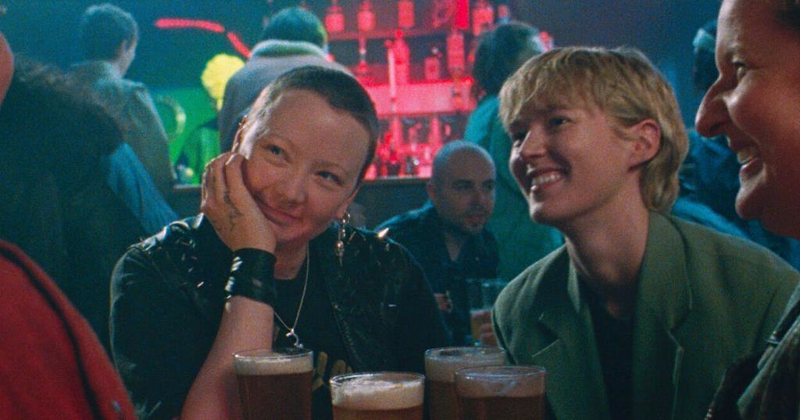
It’s the late 1980s in Britain, and Margaret Thatcher’s Conservative government is trying to push through Parliament what will eventually become the Local Government Act (1988). Section 28 (or Clause 28) of that Act prohibits councils in England, Wales and Scotland from promoting homosexuality, seen as a deviant behaviour which can be cured. In practice, this covers all institutions responsible to local government, schools among them, so (for example) anyone working as a teacher who were to declare themselves as gay would likely as not find themselves out of a job.
While all that is going on in the background, Jean undergoes something of a crisis at her workplace which soon threatens to extend beyond its boundaries. A new teenage pupil Lois (Lucy Halliday) in the netball class Jean teaches gets into fights when she becomes the subject of bullying. Lois is different from the other girls, and it soon becomes apparent that this is because she finds members of her own sex attractive rather than those of the opposite. For bully Siobhan (Lydia Page) she presents the perfect target.
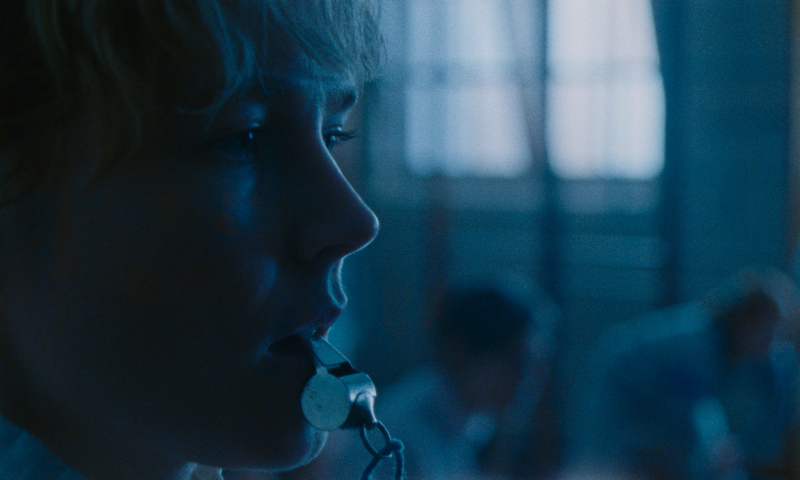
After harassing Lois for some weeks, Siobhan initiates a romantic tryst in the showers purely for the purpose of claiming Lois forced her unwelcome romantic attention upon her. The prevailing sexual mores of the day being what they are – gay people are seen as perverted not to mention potentially unfit parents; moreover, straight people are presumed to be honest and trustworthy while gay people are not. So when the two girls are hauled before the school principal to explain themselves and the straight Siobhan effectively screams “rape”, the principal has no interest in listening to the testimony of the other, untrustworthy gay party.
As Lois’ PE teacher, Jean could intervene, however that would out her to the school authorities and possibly threaten her job. So instead, Jean keeps quiet and the bully’s lie goes unchallenged. Underlying Jean’s silence, though, is Jean’s desire to take Lois under her wing knowing the prejudice the girl will likely suffer, but the fact that Jean keeps her sexuality firmly under wraps in school time – and also refuses to go out for after-work drinks with mystified colleagues because she’d rather be with her friends at the local dyke bar, or spend time alone with soulmate Viv – means that Jean can’t stand up either for the girl specifically or her own identity as a gay woman without it adversely affecting her workplace social standing and employee status.
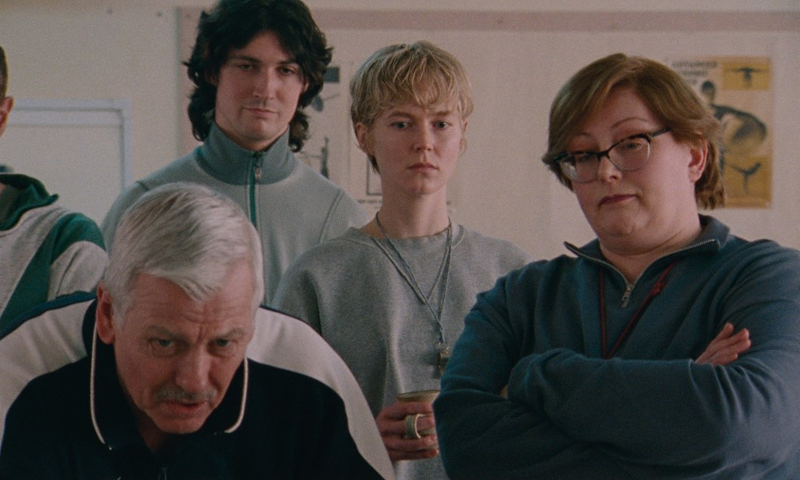
To make matters worse, before the bullying really gets going, the teenage Lois, in search (as all teenagers are) of her own self-identity, starts to frequent the same local dyke bar as Jean and her circle of friends. As a teacher, Jean maintains boundaries between herself and her pupils, so she finds Lois’ appearance in this situation to be intolerable. When Lois excuses herself to go to the ladies, Jean corners her in a cubicle to demand that she not attend the venue. For Lois, this demand must be at least as intolerable as her presence at the dyke bar is to Jean.
It would be all too easy to write this film as a tract, but commendably, rather than making it an article of faith, writer-director Oakley seems genuinely interested in her characters as characters, which affords plenty of room for the actors playing them to really get into their craft. McEwen’s Jean is an extraordinary creation – a model teacher when at work, perhaps overly so; the life and soul of the party when down the pub with her out mates. Hayes’ Viv, by way of complete contrast, is very much in your face in proclaiming her identity as a gay woman to the world.
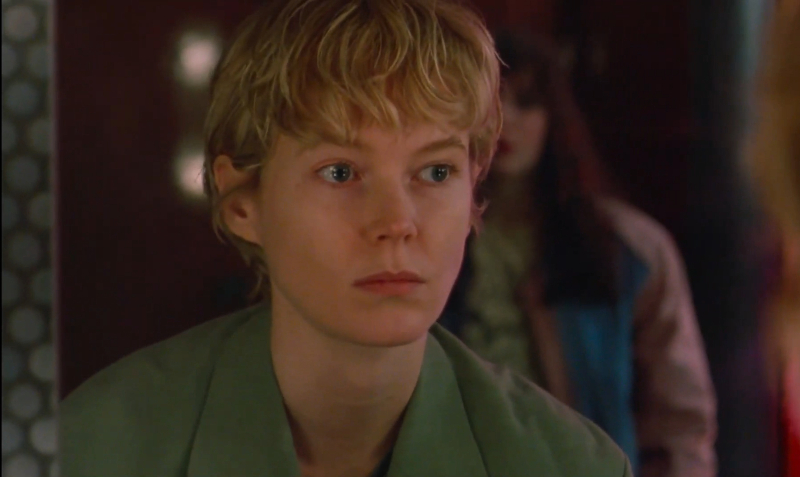
Compared to these two adults, and their peer circle, Halliday’s Lois is the shy teenager attempting to find herself and in need of emotional validation and support by people who are like her at a time when it seemed the who of British society was against gay people. This social aspect affects the other characters too: Jean is completely rent into two personalities by it, Viv and others can only deal with it in terms of aggressive, gay self-proclamation. Page’s Siobhan is, like Lois, a teenager trying to carve out her own identity, that of a bully which society ought to gently but firmly stamp on (these days, her action can be read as a form of hate crime, an offence which didn’t even exist as a verbal term beck in the 1980s).
The remarkable thing about this extraordinary film is that, regardless of your sexual orientation, it really takes you inside the personal, emotional world of a gay person struggling to be themselves in a society at a particular place and time that refused to allow people to do so in the everyday, public sphere. As if that wasn’t enough to commend the film, it’s also pretty devastating as a study of peer pressure and bullying, placing it alongside such gems as Infinity Pool (Brandon Cronenberg, 2023), Piggy (Carlota Pereda, 2022) and Blue Spring (Toshiaki Toyoda, 2001). To describe the film merely as a gay period drama (which it undeniably is) is to do it a great disservice – it’s far more than that. Oakley shows herself to be possessed of a deep understanding of what makes people tick – and that, coupled with her and her collaborator’s clear abilities at casting the perfect actors for the various roles, marks it out as essential viewing.
Blue Jean is now a subscription exclusive on BFI Player from Monday, March 27th following its UK cinema release from Friday, February 10th.
Trailer:
Twitter @AltitudeFilms
Facebook/altitudefilmdistribution
Instagram @altitudefilmUK
Altitude on YouTube
Altitude on LinkedIn
